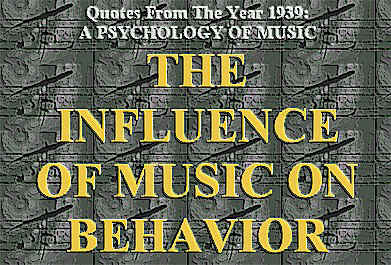It is clear that sexual selection is an important factor in the development of musical response. |
Those herds or packs that possesed the greatest numbers of highly vocal males would have a slight advantage over the less vocal groups in the struggle for existence. |
Thus the development of the capacity of producing and responding to rudimentary musical stimuli --- the raw materials of music ---is intimately connected with the great primary impulses of man, the reproductive and herd instincts. |
On the whole, it seems that musical tones and rhythm were first acquired by the male or female progenitor of mankind for the sake of charming the opposite sex. |
Changing from mode to mode, and with subtle alterations of melody and rhythm, the great alchemist moved his distinguished auditors from mad gayety and irrisistable laughter, to tears and melancholy, and from melancholy to homicidal frenzy, finally plunging them in a profound sleep, during which he was enabled to escape from the palace and return to his favorite science. |
Wild animals in captivity, particularly elephants, are often driven mad by the music of zoos and circuses. |
Music may sometimes induce a warlike spirit of great intensity. Hence, the use of crude music by primitives, and military bands by the civilized, as a means of arousing courage. |
Study of musical ecstasies is signifigant in that by repetition, ecstasies become neural habit, and true neuroses may possibly be established in this way. |
The roll of the snare drum and the wail of the saxophone evoke atavistic memories of the tom-tom and the war dance. |
Music may become the stimulus to obsessions of the most picturesque variety, or it may become the chosen means of interpretation whereby these individuals express their painful mental states. |
That music may be associated with pathological mental phenomenon is suggested by the well-known fact that so many morbid men of genius have been musicians. |
The irrational basis of music is manifest from the point of view of psycho-analysis in connection with the pleasure principle as opposed to the reality principle. |
There is much evidence that music in its original form arises from displeasure. |
Compensatory factors are important elements in musical creation and participation. When carried to an extreme, they may lead to the creation or enjoyment of music which is sentimental and has the attraction of appealing to infantile ego needs. |
Music may be measured objectively by a standard which rejects insincerity and the use of the "cliche". |
The cheif characteristic of all music is rhythm, which looked at non-technically, is a property of the mind with cognitive, emotional, and dynamic elements. |
Music shows a close correspondence with unconscious processes. The direct application of this theory of music as a narcissistic fulfillment is applied mainly to that of primitive and non-instrumental music. |
To demonstrate the sexual instinct in one of Beethoven's symphonies is obviously a vain undertaking. [not for Dr. Popeye X!] |
The most characteristic talent of the great and original composer is the power to create expressively signifigant configurations. |
Investigations of school children and adolescent psychopathics conclude that their attitude towards music is comparable to that of primitives. They both show a preference for rhythmical elements as contrasted with tonal elements, and of these they prefer dull, gloomy tones, or high, shrill, dissonant tones. |
Definite evidence can be obtained of motor sensations which may be allied with the rhythmical aspects of the music, and of various forms of imagery. Auditory imagery is strongest at the emergence of an idea. |
Sometimes, music arrouses a favorable mood on the part of patients who are otherwise unfriendly and sullen. |
Anything that will arouse interest is desirable in mental cases. Participation in various activities will keep attention away from illusions. A dementia praecox patient, who spent all day talking about her teeth, now listens to music for hours without mentioning her teeth. |
Composers have two different interpretations of the term "inspiration". For one group it is synonymous with the concept of "sudden idea"; for the other it refers to the feeling-experiences which preceed the "idea". |
As a result of the resemblance of music to the sounds and motions of physical objects, listeners sometimes constructed for themselves dramatic interpretations of visual dramas which were enjoyed for their own sake. |
General intelligence seems to have little or no positive correllation with musical intelligence. |
After a hard struggle, he finally worked his way upto the point where he gained recognition as an accomplished musician. His extraordinary musical ability had amazed critics since his early childhood. Psychological tests, reported in detail, showed that outside the field of music, his memory was poor. Great special talent is therefore compatible with poor general memory. |
this data passed on to me by |
|
